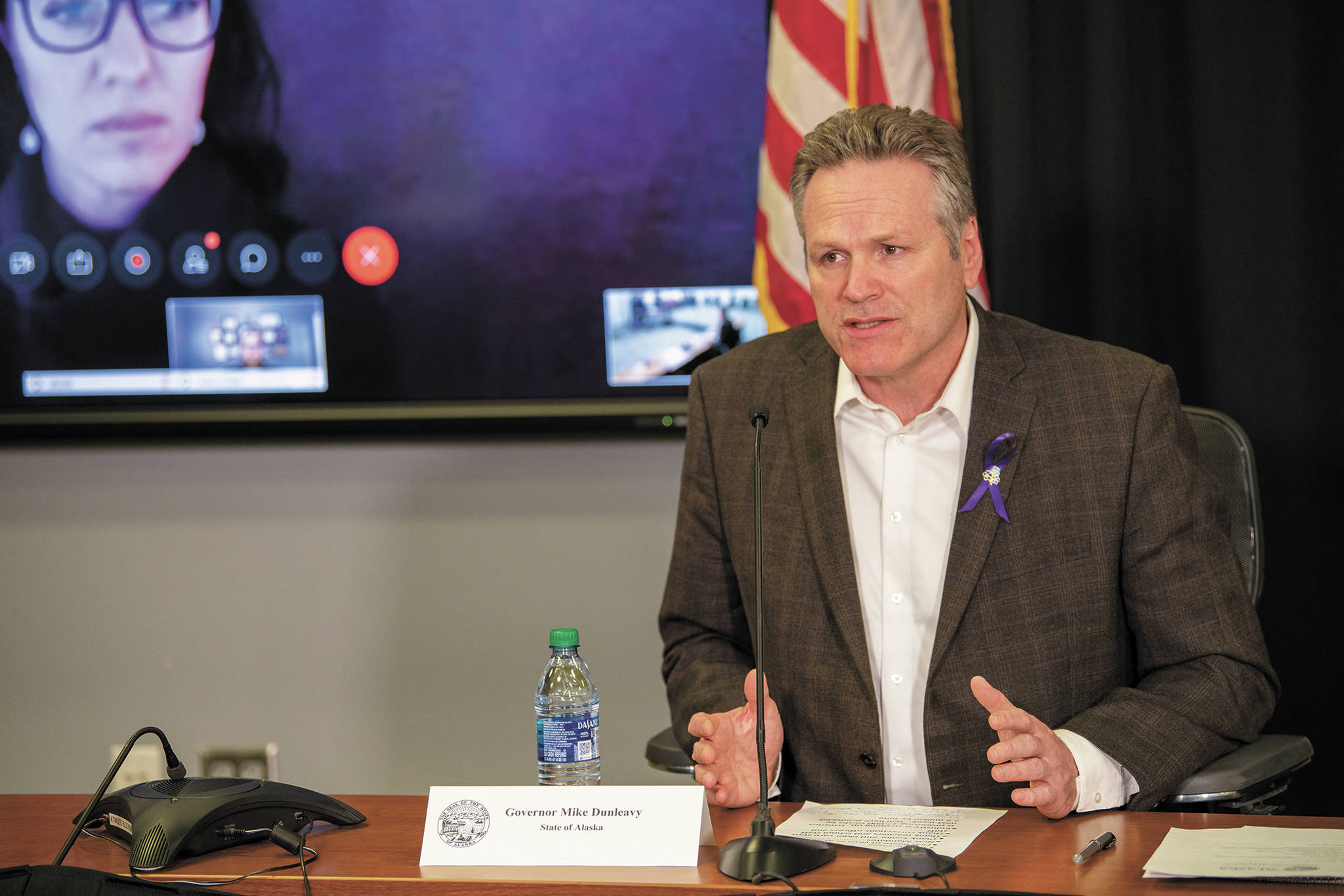With the addition of 16 new confirmed cases of COVID-19 and news of the first death within the state of Alaska, new health mandates shutting down non-essential businesses and prohibiting traveling between communities were announced by Gov. Mike Dunleavy at a Friday night press conference. A total of 85 people have tested positive for the new coronavirus, the state reports.
“The next two weeks are going to be critical to slowing this virus,” Dunleavy said.
The state also announced the first in-state death of an Alaskan. The 63-year-old woman who died at the Alaska Native Medical Center in Anchorage had underlying health conditions, according to a Friday press release. The patient was receiving treatment at the hospital for an issue not related to coronavirus, but had tested positive for it earlier this week.
This is the second Alaskan to die from the new coronavirus. The first patient was a resident from southeast Alaska who died March 16 after at a health care facility in King County, Washington, after a long stay in the area, a release from the state Department of Health and Social Services said.
The new health mandates, which are similar to other shelter-in-place, hunker down and stay put orders seen across the state and nation, shuts down any non-essential business and organizations and asks Alaskans to not travel outside their community unless it’s for a critical reason. The mandates do not prohibit residents from being outside, and Dunleavy encouraged Alaskans who go outside on walks to practice social distancing.
“You can still go out and snowmachine, four-wheel, walk your dog, jog, hike, ski, do whatever you want to do outdoors but stay six feet away or more,” he said.
Mandate 12, issued Friday, goes into effect March 28 and limits travel between communities. The mandate prohibits any in-state travel between communities, unless the travel is to “support critical infrastructure” or for “critical personal needs,” which include buying groceries or other necessities, fueling vehicles or other essential needs.
Mandate 11, issued Friday, which goes into effect March 28 and will be reevaluated April 11, shuts down non-essential businesses “in order to prevent, slow and otherwise disrupt the spread of the virus.” It also mandates that all Alaskans not involved in essential health care, government or business services “remain at their place of residence and practice social distancing.”
Social distancing means staying at least six feet away from another person.
Businesses and employees of essential infrastructure industries must, “to the extent reasonably feasible,” protect their staff and operations during this pandemic, the mandate said. The document also mandates Alaskans “work from home as much as possible.” The mandate orders any public or private gatherings of non-household members, regardless of the size of the group, to cease.
Essential infrastructure employers must submit a travel plan or protocol for maintaining critical infrastructure to akcovidplans@ak-prepared.com. The plan should outline how the work will avoid the spread of COVID-19.
Essential infrastructure includes emergency operations and health care operations as well as veterinary care services. Businesses providing services or operations and maintenance to the Port of Alaska, public works construction, construction of housing, airport operations, water, sewer, gas, electric, oil production, mining, logging, roads and highways, public transportation, solid waste collection and removal, internet and telecommunications systems. Financial services are also considered essential.
Restaurants and other businesses serving food can still serve through delivery and carry out. Local grocery stores, food banks and convenience stores that sell food are considered essential, as well as any business providing food, shelter, social services and other “necessities of life” for the “economically disadvantaged.” Gas stations, auto-supply and repair shops and hardware stores can stay open. Plumbers, electricians, exterminators and considered part of maintaining critical infrastructure. The post office will remain open, along with laundromats and dry cleaners. Media services, like newspapers, television and radio are also considered critical.
Violation of the mandate could result in a business or organization an order to cease operations and/or a civil fine of up to $1,000 per violation.
You can read both of the new mandates in their entirety here: http://dhss.alaska.gov/News/Documents/press/2020/FAQs_03272020-SOA-COVID-19-Health-Mandate-011-012.pdf
Nearly half of the state’s confirmed cases are in Anchorage (including Joint Base Elmendorf-Richardson), where a total of 39 residents have confirmed cases. There are still only five confirmed associated with the Kenai Peninsula, with two in Sterling, one in Soldotna and one in Seward. There is one case associated with a Homer resident, but that person was tested in Anchorage after returning from traveling in the Lower 48, and remains isolated in Anchorage.
There are 19 confirmed cases in the Fairbanks/North Pole area, two cases in Palmer, four cases in Juneau and 12 in Ketchikan.
Speaking again about medical supply shortages both in the state and nation wide, Dunleavy said that Palmer company TriJet Manufacturing Services will be producing 17,000 swabs that can be used to take test samples by next week. He said the company will ramp up production and that by June, there should be 2.5 million of the swabs in Alaska.
The Palmer manufacturing company is not the only one stepping up to produce needed supplies, either, Dunleavy said.
“It’s a battle with an invisible enemy,” Dunleavy said. “It’s going to be a fight for several weeks and potentially several months.”
Reach Victoria Petersen at vpetersen@peninsulaclarion.com.

